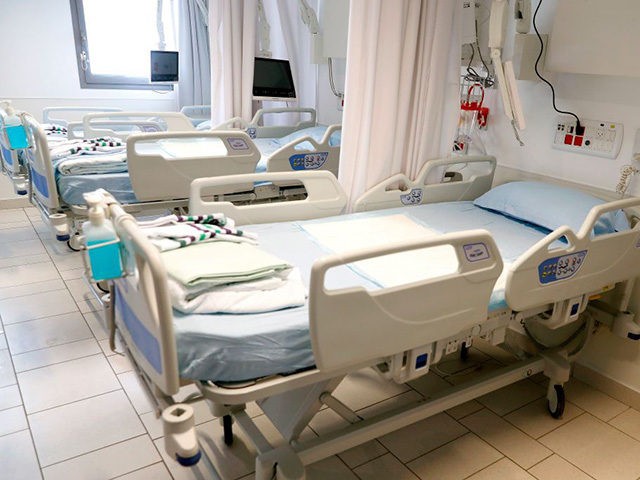Cases of the Chinese coronavirus continue to rise in Florida, increasing thousands by the day and topping 360,000 cumulative cases on Monday. However, a closer look at the data shows that hospital capacity statewide has remained relatively steady over the last two weeks, despite the addition of 150,000-plus confirmed cases since early July.
Florida reported 12,478 cases on Sunday, pushing the state’s total past 350,000. On Monday, the state reported 10,347 additional cases, bringing the cumulative total to 360,394.
The news coincides with reports of hospitals running out of ICU beds, specifically in South Florida counties, such as Miami-Dade and Broward, which account for 24 percent and 11 percent of Florida’s overall cases, respectively.
However, a closer look shows that, despite those reports, overall bed capacity across the state of Florida has remained relatively consistent during the last two weeks, despite the addition of more than 150,000 cases.
A July 5 snapshot — “Hospital Beds Census and Staffed Availability as Reported in ESS” — as displayed by Florida’s Agency for Health Care Administration, showed 14,945 available beds, with a 25.37 percent available capacity. That snapshot also showed 1,246 available adult ICU beds, with 20.5 percent availability.
A snapshot from Sunday, July 19, exactly two weeks later, showed the number of available beds dropping slightly, to 14,482, the overall availability dropping by less than two percentage points, to 23.89 percent. Similarly, the number of available adult ICU beds dropped by 100, to 1,146. The overall availability dropped by just two percent overall:
Monday’s update only showed a slight variation, 14,154 available beds, bringing availability to 23.56 percent. There were 1,112, adult ICU beds available as of Monday afternoon, equally 18.14 percent availability.
Miami-Dade, the Florida county hit hardest by the virus, reported 15.27 percent in adult ICU bed availability and 39.6 percent pediatric ICU bed availability, as of Monday afternoon.
Those numbers come in light of the Sunshine State effectively adding over 160,000 confirmed cases since July 5. The state, which boasts a population of more than 21 million, has reported 21,263 cumulative coronavirus-related hospitalizations.
Additionally, Florida’s death rate has dropped during the last two weeks, even with the consistent addition of thousands of cases per day. On Monday, July 6, Florida’s death rate stood at 1.8 percent, with 206,447 confirmed cases and 3,778 total fatalities.
Florida reported 360,394 cases and 5,072 resident deaths as of July 20, bringing the mortality rate to 1.4 percent — down from the 1.8 percent reported earlier in the month.
Florida has tested over three million people across the state, representing nearly 14 percent of the population.
Florida’s COVID-19 Data and Surveillance Dashboard reported an 11.79 percent positivity rate on Monday, down slightly from the 13.77 percent reported two weeks ago, on July 5.
Gov. Ron DeSantis (R) addressed rising concerns on Friday about hospital bed capacity, emphasizing that the availability remained greater than what the state saw in the beginning of March.
“Typically hospitals run at 90 percent, or 88 or 90 percent, that’s how they stay in business,” he said. “But now we have less than 80 percent of the beds that are actually in use, so there is capacity,” he said.
DeSantis also spoke about the effect of suspending nonelective procedures early in the pandemic, stating that it “may have contributed to an increase in deaths.”
“All of the sudden, we were looking at each other and said, ‘Where are the stroke patients? Where are the cardiac patients? How come we’re not seeing them in the emergency room?’” said Dr. Miguel Machado, chief medical officer at Flagler Health.
“Well, what happened was, a lot of people were having symptoms. They were just scared to come to the hospital,” he continued during Saturday’s press conference.
“Eventually, we will be able to figure out the mortality increase linked to people being fearful of getting care,” the governor added. “As important as the coronavirus is, if you look at the number of people that die from heart every year, it’s very, very significant. So, by not getting care, the mortality will likely, unfortunately increase there.”
News4 Jax reported:
A study in May from the health services provider Cigna found a decrease in patients for non-elective hospitalizations for acute conditions, an 11% percent decrease for coronary syndromes, a 24% decrease for gastrointestinal bleeds and a 35% decrease for irregular heartbeats.
DeSantis also stressed that, in many cases, the influx of patients is not necessarily connected to the coronavirus directly, as the Tallahassee Democrat reported:
At Flager Hospital, DeSantis observed that most people in the hospital are not there because of COVID-19.
And he speculated that much of the recent influx of patients hospitals are experiencing is from people who delayed seeking medical attention during the early days of the pandemic.
“The virus is an important issue, (but) all these other conditions. These hospitals are here to care for you and if you need the medical attention you really should go seek it,” said DeSantis as he explained that conditions in Florida are not as bleak as the picture painted by the numbers.
People returning to hospitals following the weeks-long lockdown appear to be contributing to the current state of bed capacity across the state, despite the widespread narrative that it is due almost exclusively to coronavirus patients.
“Fear is our enemy here and I think if we approach it with a steady resolve, I think we are going to handle it much, much better,” Desantis said.

COMMENTS
Please let us know if you're having issues with commenting.